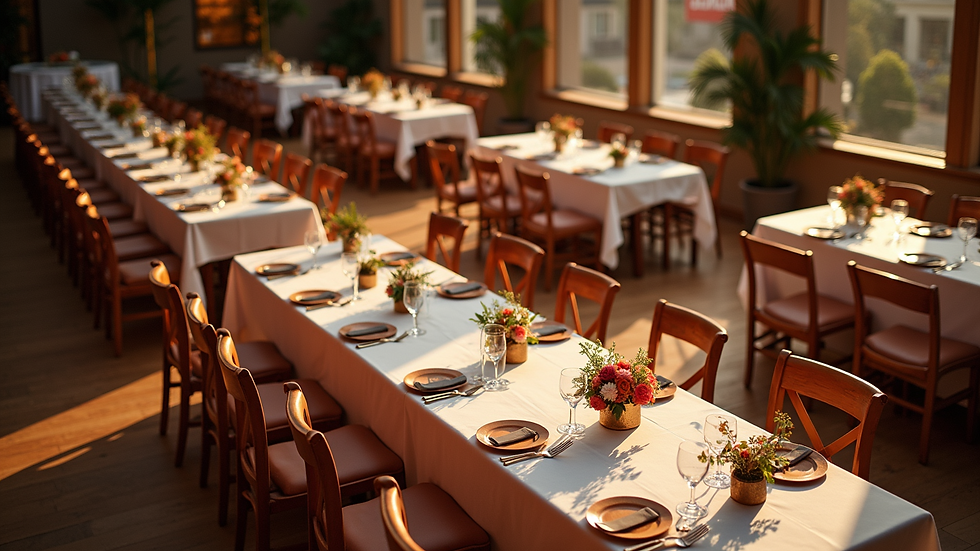Essential Tips for Seamless Event Preparation
- corbgtan
- Aug 21, 2025
- 3 min read
Planning an event can be exciting but also overwhelming. Whether you are organizing a wedding, corporate gathering, or a casual party, preparation is key to success. With the right approach, you can create memorable experiences without the stress. This guide offers essential tips to help you navigate the complexities of event planning smoothly and efficiently.
Understanding the Basics of Event Planning
Event planning involves coordinating many details to ensure everything runs smoothly on the day. It starts with setting clear goals and understanding the purpose of the event. Ask yourself what you want to achieve and who your audience is. This clarity will guide all your decisions.
Next, create a detailed timeline. Break down tasks week by week or day by day. For example, booking the venue should happen months in advance, while confirming the menu might be closer to the event date. Use tools like spreadsheets or event planning apps to keep track.
Budgeting is another critical step. List all potential expenses such as venue, catering, decorations, and entertainment. Allocate funds accordingly and always set aside a contingency amount for unexpected costs.
Practical tip: Start your planning at least three to six months before the event date to avoid last-minute rushes.

Key Elements to Consider in Event Planning
Successful event planning requires attention to several key elements. These include venue selection, catering, guest list management, and entertainment.
Venue: Choose a location that fits your event size and style. Consider accessibility, parking, and facilities.
Catering: Decide on the type of food and drinks that suit your guests’ preferences and dietary restrictions.
Guest List: Keep track of RSVPs and communicate clearly with attendees.
Entertainment: Plan activities or performances that engage your audience and match the event’s tone.
Additionally, think about logistics such as transportation, seating arrangements, and technical equipment like sound systems or projectors.
To ensure everything goes smoothly, create a checklist covering all these elements. This will help you stay organized and avoid overlooking important details.

What are the 5 W's in Event Planning?
The 5 W's are fundamental questions that guide every aspect of event planning:
Who? - Who is the event for? Identify your target audience and key participants.
What? - What type of event are you hosting? Define the theme, format, and activities.
When? - When will the event take place? Choose a date and time that works for most attendees.
Where? - Where will the event be held? Select a suitable venue considering location and capacity.
Why? - Why are you organizing this event? Clarify the purpose to align all planning efforts.
Answering these questions early helps create a focused plan and ensures all team members are on the same page.

Tips for Effective Communication and Coordination
Clear communication is vital for seamless event preparation. Keep all stakeholders informed, including vendors, staff, and guests. Use multiple channels such as emails, phone calls, and messaging apps to ensure messages are received.
Assign roles and responsibilities to your team members. For example, designate someone to handle catering, another for decorations, and someone else for guest management. This division of labor prevents confusion and overlaps.
Regular meetings or check-ins help track progress and address any issues promptly. Share updates and adjust plans as needed.
For a truly stress-free event planning experience, consider hiring a professional event coordinator who can manage these communications and logistics efficiently.
Final Steps to Ensure a Smooth Event Day
As the event day approaches, finalize all arrangements. Confirm bookings with vendors and the venue. Prepare an event day schedule detailing when each activity will happen.
Pack an emergency kit with essentials like extra batteries, tape, scissors, and first aid supplies. Have contact information for all vendors and key personnel handy.
On the day, arrive early to oversee setup and troubleshoot any last-minute issues. Stay calm and flexible, as unexpected changes can occur.
After the event, gather feedback from attendees and team members. This information is valuable for improving future events.
By following these essential tips, you can enjoy the process and deliver a successful event that leaves a lasting impression.

With careful planning, attention to detail, and effective communication, your event preparation can be smooth and enjoyable. Use these tips to create memorable experiences while minimizing stress and surprises.



Comments